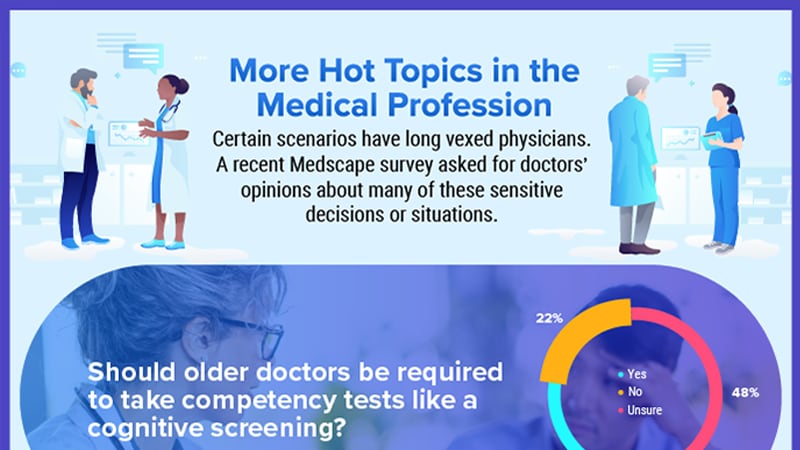Doctors' Opinions on Cognitive Tests, Dating Patients, and Marijuana Use: Insights from a Medscape Survey
Keskeiset käsitteet
A recent Medscape survey reveals insights into doctors' opinions on timely issues like mandatory cognitive testing for older physicians, ethical dilemmas like dating patients, and the need for patient education about marijuana use in light of its increasing accessibility.
Tiivistelmä
This infographic summarizes key findings from a Medscape survey about the opinions of physicians on various issues. The infographic aims to highlight some of the thought-provoking responses from doctors regarding interactions with patients, colleagues, and ethical considerations within the medical profession. The complete survey findings are available in the "Medscape Hot Topics in the Medical Profession, Part 2: 2024 Report."
Key Insights from the Infographic:
- The survey gauged doctors' opinions on whether cognitive testing should be required for physicians after a certain age.
- Ethical considerations, such as the appropriateness of doctors dating patients, were also addressed in the survey.
- With the rise of legalized marijuana, the survey explored whether physicians feel obligated to discuss the risks associated with its use with their patients.
Mukauta tiivistelmää
Kirjoita tekoälyn avulla
Luo viitteet
Käännä lähde
toiselle kielelle
Luo miellekartta
lähdeaineistosta
Siirry lähteeseen
www.medscape.com
Infographic: Cognitive Tests for Older Docs?
Tilastot
Lainaukset
Tärkeimmät oivallukset
by Jon klo www.medscape.com 10-15-2024
https://www.medscape.com/viewarticle/infographic-cognitive-tests-older-docs-it-acceptable-date-2024a1000i8d
Syvällisempiä Kysymyksiä
How might the opinions of physicians on these issues translate into actual policy changes within healthcare systems?
Physicians' opinions, as captured in surveys like the Medscape Hot Topics report, can significantly influence policy changes within healthcare systems. These opinions can act as a springboard for:
Advocacy and Lobbying: Medical associations and physician groups often leverage survey data to advocate for specific policies. For instance, if a significant percentage of physicians support mandatory cognitive testing after a certain age, these groups might lobby for legislation or regulations mandating such tests.
Shifting Professional Standards: Medical boards and licensing bodies may consider prevailing physician opinions when setting professional standards and guidelines. Opinions on issues like doctor-patient relationships, including the ethics of dating patients, could lead to stricter regulations or updated codes of conduct.
Resource Allocation and Research: Policymakers and healthcare administrators often use data on physician perspectives to inform resource allocation and research priorities. For example, if a growing number of physicians express concern about the need for more guidance on discussing marijuana use with patients, it could lead to increased funding for research and educational programs on this topic.
However, it's crucial to remember that translating physician opinions into policy is a complex process. Factors like public opinion, political climate, and economic considerations also play a significant role.
Could there be alternative viewpoints not captured in the survey that challenge the presented perspectives on cognitive testing or doctor-patient relationships?
Absolutely. Surveys, while valuable, provide a snapshot of opinions and might not capture the full spectrum of viewpoints. Here are some alternative perspectives that might not be fully represented:
Cognitive Testing:
Concerns about Ageism: Some physicians might believe that mandatory cognitive testing based solely on age is discriminatory and could lead to experienced doctors being unfairly pushed out of practice.
Emphasis on Performance-Based Assessment: Alternatives to age-based cognitive testing, such as regular performance reviews and assessments of clinical skills, might be favored by some as a fairer and more comprehensive approach.
Doctor-Patient Relationships:
Nuances of Rural Healthcare: In certain rural areas with limited healthcare access, strict prohibitions on any form of personal relationships between doctors and patients could be seen as impractical and potentially harmful to community care.
Patient Autonomy and Informed Consent: Some might argue that, with proper safeguards and full transparency, adult patients should have the autonomy to enter into consensual relationships with their physicians, provided there's no exploitation or abuse of power.
It's essential to foster open dialogue and consider these diverse perspectives when developing policies related to these sensitive issues.
What broader societal implications arise from the evolving perspectives of medical professionals on issues like marijuana use and end-of-life care?
The evolving perspectives of medical professionals on issues like marijuana use and end-of-life care have profound societal implications, influencing public policy, social attitudes, and individual choices:
Marijuana Use: As medical marijuana gains wider acceptance and recreational use is legalized in more regions, physicians are increasingly on the front lines of navigating this complex landscape. Their evolving perspectives can shape:
Public Health Messaging: Physicians are trusted sources of information, and their views on the risks and benefits of marijuana use can influence public health campaigns and educational initiatives.
Regulation and Access: Physician input is crucial in shaping regulations related to the prescription, dispensing, and use of medical marijuana, impacting patient access and safety.
End-of-Life Care: As medical technology advances and societal views on death and dying evolve, physicians are grappling with ethical dilemmas and end-of-life care decisions. Their perspectives influence:
Legislation and Policy: Physician opinions on issues like physician-assisted dying and advance care planning play a significant role in shaping legislation and healthcare policies related to end-of-life care.
Public Discourse and Acceptance: Open discussions among medical professionals about death and dying can help destigmatize these topics and encourage broader societal conversations about end-of-life wishes and palliative care options.
In conclusion, the evolving perspectives of medical professionals on these critical issues have far-reaching societal implications, shaping public policy, influencing social norms, and ultimately impacting individual lives.
0
